
Blind Willie Johnson was an American gospel blues singer and guitarist. His landmark recordings completed between 1927 and 1930—thirty songs in total—display a combination of powerful "chest voice" singing, slide guitar skills, and originality that has influenced generations of musicians. Even though Johnson's records sold well, as a street performer and preacher, he had little wealth in his lifetime. His life was poorly documented, but over time, music historians such as Samuel Charters have uncovered more about Johnson and his five recording sessions.
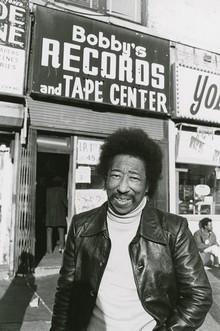
Morgan Clyde "Bobby" Robinson was an American independent record producer and songwriter in New York City, most active from the 1950s through the mid-1980s.
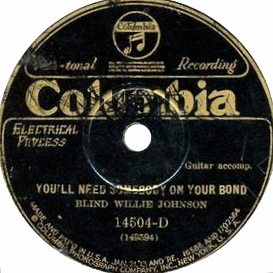
"You'll Need Somebody on Your Bond" is a gospel song that is attributed to both tradition and to gospel blues musician Blind Willie Johnson. Johnson first recorded the song in December 1930, although Delta blues musician Charley Patton recorded a similar "You're Gonna Need Somebody When You Die" in October 1929. Over the years, several other musicians have recorded renditions of the song.

"In My Time of Dying" is a gospel music song by Blind Willie Johnson. The title line, closing each stanza of the song, refers to a deathbed and was inspired by a passage in the Bible from Psalms 41:3 "The Lord will strengthen him upon the bed of languishing, thou wilt make all his bed in his sickness". Numerous artists have recorded variations, including Bob Dylan and Led Zeppelin.

Screamin' and Hollerin' the Blues: The Worlds of Charley Patton is a boxed set collecting remastered versions of the recorded works of blues singer Charley Patton, with recordings by many of his associates, supplementary interviews and historical data. The set won three Grammy awards, for Best Historical Album, Best Boxed or Special Limited Edition Package, and Best Album Notes.

"John the Revelator" is a gospel blues call and response song. Music critic Thomas Ward describes it as "one of the most powerful songs in all of pre-war acoustic music ... [which] has been hugely influential to blues performers". American gospel-blues musician Blind Willie Johnson recorded "John the Revelator" in 1930. Subsequently, a variety of artists, including the Golden Gate Quartet, Son House, Depeche Mode, Jerry Garcia Band, The White Stripes, The Forest Rangers, The Sword, have recorded their renditions of the song, often with variations in the verses and music.
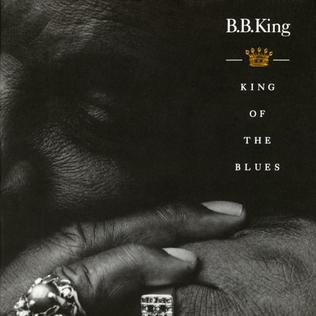
King of the Blues is a compilation album by American blues musician B. B. King covering the years 1949 through 1991. Released by MCA Records in 1992, the four CD box set includes some of King's most popular songs as well as some newer recordings.

"(The) Soul of a Man" is a gospel blues song recorded by Blind Willie Johnson in 1930. As with most of Johnson's songs, it deals with a spiritual theme within a blues musical framework. Accompanying Johnson is Willis B. Harris, sometimes identified as his first wife, who sang harmony on the refrain:

"It's Nobody's Fault but Mine" or "Nobody's Fault but Mine" is a song first recorded by gospel blues artist Blind Willie Johnson in 1927. It is a solo performance with Johnson singing and playing slide guitar. The song has been interpreted and recorded by numerous musicians in a variety of styles, including Led Zeppelin on their 1976 album Presence.

In Progress & In Motion: 1965-1998 is a compilation album by American blues artist Taj Mahal, which was released in 1998.

The Soul of a Man is an album of "twenty haunting spiritual blues songs" recorded in the late 1920s and 1930 by the American gospel blues singer and guitarist Blind Willie Johnson that was released by Charly Records in 2003.

"Bye and Bye We're (or, I'm) Going to See the King" is a Christian song from the African-American musical tradition. It is known by a variety of titles, including "I Wouldn't Mind Dying (If Dying Was All)" and "A Mother's Last Word to Her Daughter". It was recorded seven times before 1930, using the preceding titles.
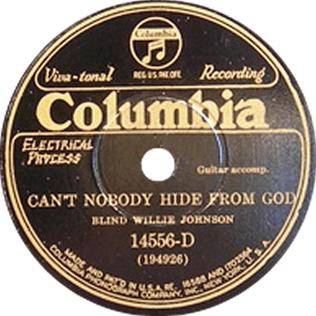
"Can't Nobody Hide from God" is a traditional gospel blues song recorded in 1930 by Blind Willie Johnson with by Willis B. Harris, who is thought to have been his first wife. It was released as a single on Columbia Records, backed with "If It Had Not Been For Jesus"
"(I Know) His Blood CanMake Me Whole" is a traditional gospel blues song recorded by Blind Willie Johnson in 1927. It was released on his first single, with the flip side "Jesus Make Up My Dying Bed".
"Trouble Will Soon Be Over" is a traditional gospel blues song recorded in 1929 by Blind Willie Johnson and Willis B. Harris, who is thought to have been his first wife.
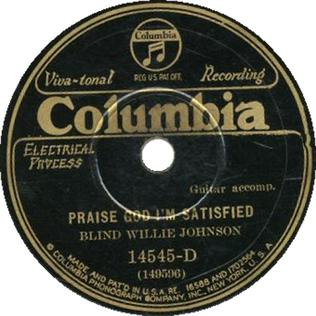
"Praise God I'm Satisfied" is a traditional gospel blues song recorded in 1929 by Blind Willie Johnson and Willis B. Harris (vocals), who is thought to have been his first wife.

"The Rain Don't Fall on Me" is a gospel blues song recorded in 1929 by Blind Willie Johnson and Willis B. Harris (vocals), who is thought to have been Johnson's first wife.
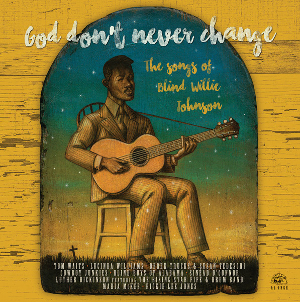
God Don't Never Change: The Songs of Blind Willie Johnson earned Grammy Award nominations for Best Roots Gospel Album and Best American Roots Performance for Blind Boys of Alabama recording of Mother's Children Have a Hard Time. The compilation was produced by Jeffrey Gaskill of Burning Rose Productions. The package features extensive historical liner notes by author Michael Corcoran.

American Epic: The Best of Blind Willie Johnson is a compilation album released to accompany the award-winning American Epic documentary film series. It collects performances from Blind Willie Johnson's five recording sessions for Columbia Records in Dallas, Atlanta, and New Orleans between 1927 and 1930. The album was released as a 16-track download and a vinyl LP.

















